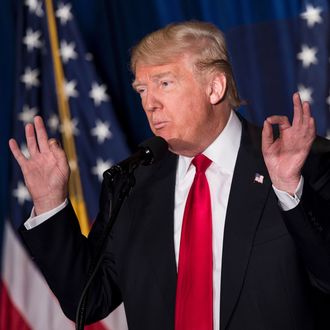
Donald Trump didn’t come here to make friends.
When the GOP front-runner announced that he would be delivering a major foreign-policy address this Wednesday, most pundits expected a reprise of his AIPAC speech: a carefully scripted embrace of Republican orthodoxy that distanced the candidate from his more idiosyncratic musings. This expectation was bolstered by reports that his campaign was planning to rebrand the mogul to fit with fall fashions. In a private meeting with GOP heavyweights, Trump’s new strategist, Paul Manafort, promised a new and defused Donald 2.0, one capable of reversing the candidates’ devastating disapproval numbers by projecting an aura of stability and competence.
But at the Mayflower Hotel, Trump crammed all of his geopolitical heresies into a teleprompter and proudly recited them. Which doesn’t mean that the speech wasn’t presidential. While the address will not win hearts and minds at the American Enterprise Institute, it very well might in the living rooms of Real America, and for precisely the same reason: Trump’s foreign policy caters to an underserved market, one that rejects the long-standing bipartisan consensus on matters of immigration, trade, and military intervention. Trump speaks to an American middle class that is less concerned with the details of his counterterrorism strategy than with the overriding sense that their government puts the interests of foreigners ahead of their own.
On Wednesday, the presumptive GOP nominee vowed that he wouldn’t surround himself with advisers “who have perfect résumés but very little to brag about except responsibility for a long history of failed policies and continued losses at war.”
“We have to look to new people,” Trump continued. “Because many of the old people frankly don’t know what they’re doing, even though they may look awfully good writing in the New York Times or being watched on television.”
Trump pledged that, unlike these camera-friendly “experts,” he would never “surrender this country or its people to the false song of globalism.”
“The nation-state remains the true foundation for happiness and harmony,” Trump continued. “I am skeptical of international unions that tie us up and bring America down.”
Trump then promised that he would never enter any union that reduced America’s ability to “control our own affairs.” His first and only example of such a union was NAFTA, a bipartisan trade agreement that the entire foreign-policy Establishment once described as a “no-brainer.” But Trump went farther than rejecting lousy trade deals (a common enough posture on the campaign trail), by reiterating his commitment to punish any corporation that leaves the United States.
“There will be consequences for the companies that leave the United States only to exploit it later,” he declared. “Under a Trump administration, no American citizen will ever again feel that their needs come second to the citizens of a foreign country.”
To dispel such feelings, Trump called on America’s allies to make greater contributions to our military spending, or else forfeit our guarantee of protection. He promised to balance our trade deficit with China, “and I mean quickly,” even if that requires the two great superpowers to “go our separate ways.” He assured the country that, unlike Obama, if President Trump flies overseas to try to bring the Olympics to our shores, he will win.
As with so many of the Donald’s remarks, most of his address at the Mayflower reads like satire. His speech was framed as a call for “a disciplined, deliberate, and consistent foreign policy,” yet was littered with obvious contradictions: Trump criticized Obama for raising doubts about America’s willingness to support its allies — then promised that if those allies refused to donate to American arms manufacturers, “the U.S. must be prepared to let these countries defend themselves.” He lamented America’s misguided interventions in Iraq and Libya and Obama’s reluctance to intervene in Syria. He called nuclear weapons “the single biggest problem that we have today in the world,” and demanded that we “renew” our nuclear-weapons arsenal. He promised that “unlike other candidates for the presidency, war and aggression will not be my first instinct,” then suggested that Iran’s brief detention of ten U.S. sailors (who had drifted into its territorial waters) was an act of belligerence that demanded a muscular response.
And then there was his plan for defeating ISIS, which reads like a book report from a sixth-grader who didn’t do the reading.
“And then there’s ISIS. I have a simple message for them. Their days are numbered. I won’t tell them where and I won’t tell them how,” he said, then promised that he would never, ever let the American people know how he expects to defeat the primary threat to their well-being. “We have to be unpredictable. And we have to be unpredictable starting now.”
But for all its intellectual deficiencies, Trump’s address also displayed no small amount of emotional intelligence, speaking directly to the sense of frustrated nationalism haunting the Rust Belt. In public-opinion surveys, Americans famously overestimate the amount of the federal budget devoted to foreign aid — and always, always, always demand for that aid to be cut. While these patriots are mistaken about how their tax dollars are allocated, there is some validity to the feelings of disenfranchisement that these estimates express. American trade policies have never been designed with the working class’s interests in mind. In fact, most of the trade agreements the United States forged in the postwar period were explicitly tailored to advantage foreign exporters over domestic ones, so as to secure Western Europe and Japan as allies in the Cold War. Economists have estimated that more recent agreements like NAFTA and the China-WTO deal cost the United States hundreds of thousands of manufacturing jobs. And, of course, the working class enjoyed little reward for its disproportionate participation in the last 15 years of foreign wars.
The bipartisan consensus on geopolitics has failed a lot of people. War on that consensus is the health of Trump’s campaign.






























